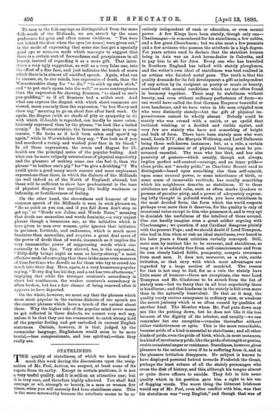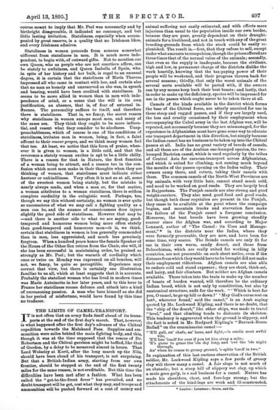STATELINESS.
THE quality of stateliness, of which we have heard so much this week during the discussions upon the resig- nation of Mr. Peel, derives, we suspect, at least some of its repute from its rarity. Except in certain positions, it is not a very useful quality, and it is seldom an attractive one; but it is very rare, and therefore highly admired. You shall find courage or wit, strength or beauty, in a man or woman five times, when you will scarcely find true stateliness once. This is the more noteworthy because the attribute seems to be so entirely independent of rank or education, or even mental power. A few Kings have been stately, though only one- Charlemagne—is remembered for his stateliness, a few nobles, and a few great Churchmen ; but we also meet a few peasants and a few artisans who possess the attribute in a high degree. For years artists used to declare that the stateliest human being in Asia was an Arab horse-dealer in Calcutta, and to pay him to sit for Jove. Every one who has travelled in Southern England has talked with stately ploughmen, and the writer's own ideal of stateliness was best realised in an artisan who finished metal pens. The truth is that the quality demands for its full development a gift as independent of any action by its recipient as poetry or music or beauty, combined with mental conditions which are not often found in harmony together. There may be stateliness without beauty, and even without ordinary perfectness of form—no one would have called the first German Emperor beautiful or even handsome, and we have twice in life seen crippled men who were distinctly stately—but the gift of physical im- pressiveness cannot be wholly absent. Nobody could be stately who was cursed with a smirk, or an eyelid that imitated winking, or a decided and visible squint, and very few are stately who have not something of height and bulk of form. There have been stately men who were small, Louis XIV., the Marquis Wellesley, and Lord Dalhousie being three well-known instances ; but, as a rule, a certain grandeur of presence or of physical bearing must be pro- nounced essential. The man who has that, and has also passivity of gesture—which usually, though not always, implies perfect self-control—courage, and an inner pride— clean pride, not "mucky pride," as Charlotte Bronte used to distinguish—based upon something else than self-conceit, upon some unusual power, or some inheritance of birth, or some sense of immovable rectitude, has usually something which his neighbours describe as stateliness. If to these attributes are added calm, such as often marks Quakers or persons of peculiar piety, and a power of adequately express- ing lofty thought in pellucid words, you have stateliness in the most decided form, the form which the world respects perhaps even more than it deserves, for the quality is only of occasional value except to him who possesses it, and is very apt to diminish the usefulness of the intellect of those around. One can hardly imagine even a great soldier arguing with Charlemagne ; we question if any Cardinal disagrees plainly with the present Pope; and we should doubt if Lord Tennyson, who had in him when at rest an ideal stateliness, ever heard in his later years a frank criticism verbally conveyed. Still, most men by instinct like to be reverent, and stateliness, so long as it is absolutely free from self-consciousness and from its own closely linked foible, pomposity, compels reverence from most men. It does not, moreover, as a rule, excite irritation, or that envy with which most advantages are regarded by a large section of mankind. The reason for that is not easy to find, for as a rule the stately have little sense of humour—there are exceptions, else were Lord Tennyson and Mr. Gladstone to be struck from the list of stately men—bat we fancy that in all true superiority there is kindliness ; and that kindness in the stately is felt even more than in the naturally benevolent. Be that as it may, the quality rarely excites annoyance in ordinary men, or awakens the secret jealousy which is so often roused by qualities of another kind. The Member whom Mr. Peel puts down may not like the putting down, but he does not like it the less because of the dignity of the rebuker, and usually—we can remember but one exception—remains thereafter without either vindictiveness or spite. This is the more remarkable, because pride of a kind is essential to stateliness ; and all other kinds of pride, even the pride of birth, which, in most instances, is a kind of involuntary pride, like the pride of strength or genius, excite occasional anger or resistance. Stateliness, however, gives pleasure to the onlooker even if he is suffering from it, and in the pleasure irritation disappears. No subject is known to have displayed personal hatred towards Frederick the Great, perhaps the least urbane of all the stately personages who cross the disk of history, and this, although his tongue almost or quite drove officers to suicide. They felt in him some quality which in his position gave him a right to his use of flogging words. The worst thing the bitterest Irishman would say of Mr. Peel, even after conflict with him, was that his stateliness was "very English," and though that was of ,course meant to imply that Mr. Peel was necessarily and by birthright disagreeable, it indicated no contempt, and but little lasting irritation. Stateliness, especially when accom- panied by great reserve, is a quality that no Irishman likes, and every Irishman admires.
Stateliness in women proceeds from sources somewhat -nifferent from stateliness in men. It is much more inde- pendent, to begin with, of outward gifts. Not to mention our own Queen, who as people who are not courtiers affirm, can be stately to awfulness, and Queen Isabella of Spain, who, in spite of her history and her bulk, is regal to an unusual degree, it is certain that the stateliness of Maria. Theresa impressed all who came in contact with her, and certain also that no man as homely and unreserved as she was, in speech and bearing, would have been credited with stateliness. It seems to be more allied in women than in men with inde- pendence of mind, or a sense that the will is its own justification, an absence, that is, of fear of external in- linenee. The personality suffices to itself, and therefore there is stateliness. That is, we fancy, the secret reason why stateliness in women annoys most men, and many of the same see. They think they ought to be more influen- tial, and resent what they consider to be aloofness. Unap- proachableness, which of course is one of the conditions of stateliness, irritates men in women, being, in fact, a faint affront to their amour-propre, and we think many women feel that too. At least, we notice that this form of praise, when- -ever it is given to women, is a little cold, and that the reverence a stately woman excites is apt to be a little chilly. There is a. reason for that in Nature, the first function of a woman being to attract, and a reason too in the con- fusion which most men make in their thoughts when they are thinking of women, that stateliness must indicate either .hauteur or unkindliness. Very often it is not so at all, some of the sweetest women being stately, but the mistake is nearly always made, and when a man or, for that matter, a woman attributes to a woman stateliness, there is seldom complete cordiality in the eulogistic word. Perhaps, too, though we say this without certainty, no woman is over quite so unconscious of what we may call a fighting quality as a man can be, and the nuance of consciousness does injure slightly the good side of stateliness. However that may be —and there is another aide to what we are saying, good- tempered and humorous women being more often stately than good-tempered and humorous men—it is, we think, certain that stateliness in women is less generally commended than in men, less appreciated, and much less genuinely forgiven. When a hundred years hence the female Speaker of the House of the Other Sex retires from the Chair, she will, if she has been successful in maintaining order, be praised as strongly as Mr. Peel ; but the warmth of cordiality which once or twice on Monday was expressed on all benches, will not, we fancy, be quite so perceptible. Experience may correct that view, but there is certainly one illustration familiar to us all, which at least suggests that it is accurate. Probably the stateliest woman who has lived in modern times was Marie Antoinette in her later years, and to this hour in France her stateliness rouses defence and attack into a kind of unreasoning passion. A man who bore himself as she did in her period of misfortune, would have found by this time no traducer.



































 Previous page
Previous page